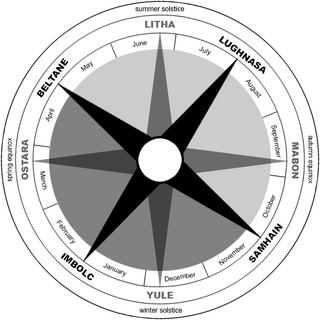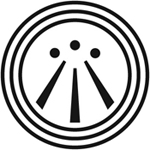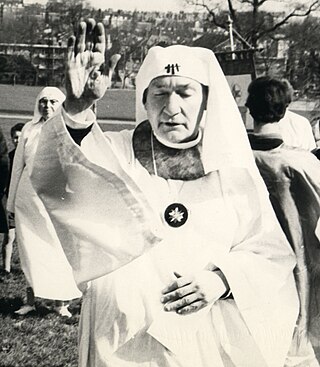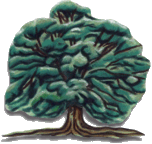
Modern paganism, also known as contemporary paganism and neopaganism, is a term for a religion or a family of religions which is influenced by the various historical pre-Christian beliefs of pre-modern peoples in Europe and adjacent areas of North Africa and the Near East. Although they share similarities, contemporary pagan movements are diverse and as a result, they do not share a single set of beliefs, practices, or texts. Scholars of religion often characterise these traditions as new religious movements. Some academics who study the phenomenon treat it as a movement that is divided into different religions while others characterize it as a single religion of which different pagan faiths are denominations.

The Wheel of the Year is an annual cycle of seasonal festivals, observed by a range of modern pagans, marking the year's chief solar events and the midpoints between them. British neopagans crafted the Wheel of the Year in the mid-20th century, combining the four solar events marked by many European peoples, with the four seasonal festivals celebrated by Insular Celtic peoples. Different paths of modern Paganism may vary regarding the precise timing of each celebration, based on such distinctions as the lunar phase and geographic hemisphere.
Ronald Edmund Hutton is an English historian who specialises in early modern Britain, British folklore, pre-Christian religion and Contemporary Paganism. He is a professor at the University of Bristol, has written 14 books and has appeared on British television and radio. He held a fellowship at Magdalen College, Oxford, and is a Commissioner of English Heritage.

The Order of Bards, Ovates & Druids or OBOD is a Neo-Druidic organisation based in England, but based in part on the Welsh Gorsedd of Bards. It has grown to become a dynamic druid organisation, with members in all parts of the world.
Emma Restall Orr is a British animist, philosopher, poet, environmentalist, and author.

Celtic neopaganism refers to any type of modern paganism or contemporary pagan movements based on the ancient Celtic religion. One approach is Celtic Reconstructionism (CR), which emphasizes historical accuracy in reviving Celtic traditions. CR practitioners rely on historical sources and archaeology for their rituals and beliefs, including offerings to spirits and deities. Language study and preservation are essential, and daily life often incorporates ritual elements. While distinct from eclectic pagan and neopagan witchcraft traditions, there is some overlap with Neo-druidism.
Philip Carr-Gomm is an author in the fields of psychology and Druidry, a psychologist, and one of the leaders and former Chosen Chief of The Order of Bards, Ovates and Druids.

Philip Peter Ross Nichols was a Cambridge academic and published poet, artist and historian, who founded the Order of Bards, Ovates and Druids in 1964. He wrote prolifically on the subjects of Druidism and Celtic mythology.
Rev. Robert Lee "Skip" Ellison is a Druid priest and liturgist and an author in the fields of Druidry, Magic and divination. He was initiated into a Celtic Traditional Wiccan coven in 1982. He has been a member of the Druidic organization Ár nDraíocht Féin since 1990, serving on its Mother Grove since 1992. He served as ADF's Archdruid, and is Chief of its Magician's Guild. He was the grove Organizer for Muin Mound Grove, ADF, and became its second Senior Druid, a position he held since 1992. He has been a frequent speaker at Neo-Pagan events including the Starwood Festival, Sirius Rising, and the Wellspring Gathering. He has created a magical training system based on the trees of the forest, and has authored four books on Druidry and divination. He is also a retired industrial electrician.
Modern paganism in the United States is represented by widely different movements and organizations. The largest modern pagan religious movement is Wicca, followed by Neodruidism. Both of these religions or spiritual paths were introduced during the 1950s and 1960s from Great Britain. Germanic Neopaganism and Kemetism appeared in the US in the early 1970s. Hellenic Neopaganism appeared in the 1990s.

The Modern Pagan movement in the United Kingdom is primarily represented by Wicca and Neopagan witchcraft, Druidry, and Heathenry. 74,631 people in England, Scotland and Wales identified as either as Pagan or a member of a specific Modern Pagan group in the 2021 UK Census.
Philip Shallcrass, often known by his Druid name, Greywolf, is Chief of the British Druid Order. He is an English artist, writer, poet, musician and singer-songwriter who pioneered a "shamanic" Druidism.
Brendan Cathbad Myers is a Canadian philosopher and author known for his contributions in environmental philosophy, Druidry and Neo-Druidism, mythology, and applied virtue ethics.

The Druid Network is a British druidic (neo-pagan) organisation providing a source of information and inspiration about modern Druidic traditions, practices and their histories. It was founded in February 2003 by Emma Restall Orr, and approved as a religious charity in the United Kingdom in 2010.

Druidry, sometimes termed Druidism, is a modern spiritual or religious movement that promotes the cultivation of honorable relationships with the physical landscapes, flora, fauna, and diverse peoples of the world, as well as with nature deities, and spirits of nature and place. Theological beliefs among modern Druids are diverse; however, all modern Druids venerate the divine essence of nature.

The Pagan Religions of the Ancient British Isles: Their Nature and Legacy is a book of religious history and archaeology written by the English historian Ronald Hutton, first published by Blackwell in 1991. It was the first published synthesis of the entirety of pre-Christian religion in the British Isles, dealing with the subject during the Palaeolithic, Neolithic, Bronze Age, Iron Age, Roman occupation and Anglo-Saxon period. It then proceeds to make a brief examination of their influence on folklore and contemporary Paganism.

The Council of British Druid Orders is a neo-pagan group established in 1989 which was originally formed to facilitate ceremonies at Stonehenge. The council's founder, Tim Sebastion, used the title "Archdruid of Wiltshire, Chosen Chief of the Secular Order of Druids, Conservation Officer for the Council of British Druid Orders and Bard of the Gorsedd of Caer Abiri (Avebury)."

Ossian D'Ambrosio, also known simply as Ossian, is an Italian heavy metal musician, organiser within modern Druidry, artisan jeweler and writer. He is the founder and leader of the Cerchio Druidico Italiano and creator of an annual Beltane festival in Biella. He plays guitar in the symphonic black metal band Opera IX, which he founded in 1988.











